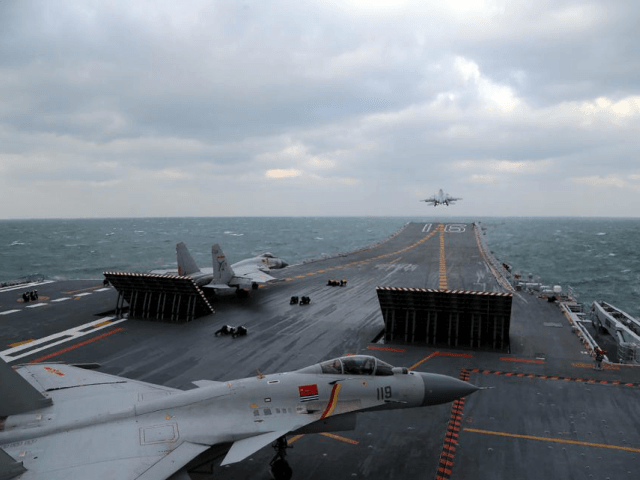Taiwanese Deputy Minister: Chinese Military Exercises Aimed at the U.S.

STR/AFP/Getty Images
TAIPEI, TAIWAN — Larger and more frequent Chinese military exercises near Taiwan are aimed at the United States, not Taiwan, according to a Taiwanese deputy minister.
“The second largest power is challenging the biggest existing power, and that is the United States,” Deputy Minister of Mainland Affairs Council Chang Tien-chin told reporters on Monday.
Chang also cited China’s ambition to become the world’s dominant power by 2049 as a reason for its muscle flexing.
“Xi Jinping’s ambition is that China to rejuvenate and become the strongest power in the world by the time of 2049,” he said.
“So you can see in South China Sea, a lot of reef or island has been established military facilities. He aims not to Taiwan. He aims to the world.”
His comments came in response to reporters’ questions over whether he is concerned about China’s growing militarization of disputed islands in the South China Sea, and the increasing frequency and size of Chinese military naval and air exercises near Taiwan.
He said one U.S. action that prompted anger from China was the passage of a provision in the 2018 National Defense Authorization Act, which authorized U.S. ships to make calls at Taiwanese ports and Taiwanese ships to make calls at American ports. China has threatened to invade Taiwan if a U.S. warship visits a Taiwanese port.
Another was the passage Taiwan Travel Act in March, which encourages visits between officials of the U.S. and Taiwan. Alex Wong, deputy assistant secretary in the State Department’s Bureau of East Asian and Pacific Affairs, visited the country shortly after.
Chang said he did not think there was a real risk of a military attack against Taiwan.
“We do not so much place concern on their military exercises because the kind of military exercises I think is toward the United States, not to Taiwan,” he said. “I don’t think he will risk any opportunity to become the strongest power simply by attacking Taiwan.”
However, other Taiwanese officials privately acknowledge the exercises are also to intimidate Taiwan.
Tensions between China and Taiwan have been rising since the pro-independence Democratic Progressive Party became the dominant political party in Taiwan in January 2016.
Taiwan President Tsai Ing-wen in April supervised a Taiwanese military drill aboard a warship for the first time since she took office last May, according to Agence France Press. The drill simulated an attack on the island.
The drill came just days before China conducted a live-fire exercise in the Taiwan Strait and after weeks of Chinese naval maneuvers in the strip of water that separates the mainland from the island.
Under current Chinese President Xi Jinping, Beijing has stepped up efforts to diplomatically isolate Taiwan and assert its “One China” policy globally, which states that Taiwan is a part of China, not a separate country.
Taiwan, a democracy, maintains it is a separate country. U.S. policy acknowledges China’s stance and does not take a position on Taiwan’s status, but provides Taiwan with military equipment.
Taiwan has 19 official allies, but China has succeeded in getting three of them to cut official diplomatic ties since Tsai took office last year. China last year demanded that five countries rename Taiwan’s unofficial embassies in their countries and move them outside of their capitals.
Recently, China has been demanding that American firms that do business in China delete all references to Taiwan as a separate country from their websites and promotional materials. Beijing sent a letter to 36 airlines ordering them to follow suit.
And China is blocking Taiwan from being invited for the second year in a row to the World Health Assembly, hosted by the World Health Organization in Geneva later this month.
Taiwan has attended the assembly as an observer from 2009 through 2016. The director of Beijing’s Taiwan Affairs Office Zhang Zhijun said it was due to Tsai’s refusal to recognize China’s One China policy, according to the New York Times.





Comments are closed.